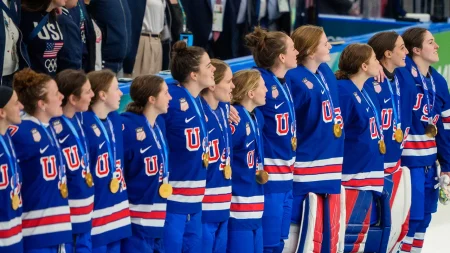The NCAA women’s volleyball tournament experienced a remarkable surge in viewership this year, with television ratings doubling compared to the previous year. This follows a similar trend from 2022 to 2023, where ratings increased by a staggering 115%. NCAA President Charlie Baker proudly announced this growth, emphasizing the public’s appetite for competitive sports and advocating for a shift in perspective away from labeling sports outside of football and basketball as “non-revenue.” This positive momentum for women’s volleyball comes on the heels of a season marked by a significant controversy involving San Jose State University (SJSU) and a transgender athlete, a controversy that nearly propelled the team into the national spotlight of the NCAA tournament.
The controversy revolved around SJSU volleyball player Blaire Fleming, a transgender woman. Teammate Brooke Slusser filed a lawsuit against the NCAA and co-led another suit with other players against the Mountain West Conference, alleging that they were forced to compete alongside Fleming without being informed of her biological sex at birth. This situation sparked a wave of forfeitures, unprecedented in the sport’s history, as seven opposing teams refused to play against SJSU during the regular season, and another forfeited during the conference tournament. The controversy escalated further, resulting in threats against Slusser and the need for police protection for the team at all games, both home and away.
The SJSU transgender athlete controversy extended beyond the realm of sport, drawing national attention and political commentary. Former President Donald Trump weighed in on the issue during a Fox News town hall, highlighting the growing national debate surrounding transgender athletes in women’s sports. SJSU’s handling of the situation also drew criticism, with the university admitting to not informing opposing teams about Fleming’s transgender status before games, only notifying them of heightened security needs. This lack of transparency further fueled the controversy and contributed to the rising tensions surrounding the team.
The legal battle surrounding Fleming’s participation intensified as Slusser and other players sought a court order to bar Fleming from competing in the Mountain West Conference tournament. Their request for an emergency injunction was denied by Colorado District Judge Kato Crews, who ruled that such a drastic measure would disrupt the tournament and prejudice SJSU and other participating teams. This decision allowed Fleming to continue playing, further highlighting the complex legal and ethical questions surrounding transgender athletes’ participation in women’s sports.
With Fleming’s eligibility confirmed, the Mountain West Conference tournament proceeded with a unique backdrop. SJSU advanced directly to the semifinals due to Boise State forfeiting their match, a consequence of Idaho’s executive order prohibiting transgender athletes in women’s sports. This marked the third forfeiture by Boise State against SJSU that season, emphasizing the conflicting regulations and deeply held beliefs surrounding the issue. Despite the contentious circumstances, SJSU made it to the championship game, facing off against Colorado State.
The championship match against Colorado State represented the culmination of a tumultuous season for SJSU. A loss in the final prevented the Spartans from advancing to the NCAA tournament, bringing an end to their controversial season. Head Coach Todd Kress acknowledged the emotional toll the controversy took on his team, highlighting the hateful messages directed at players, coaching staff, and others associated with the program, each forfeiture amplifying the vitriol and highlighting the broader societal tensions surrounding transgender athletes in competitive sports. The case of SJSU brought the complex intersection of sports, gender identity, and legal battles into sharp focus, leaving a lasting impact on the landscape of college athletics.















